Getting your Trinity Audio player ready...
Israel swore in a new government under right-winger Naftali Bennett on Sunday evening, ending a 12-year term in office for Benjamin Netanyahu and ushering in a coalition that for the first time in the country's history has an Arab party as a member.
The new government, which has the narrowest possible majority of 61 in the 120-strong Knesset, was confirmed by a vote of 60 to 59, with a handful of members of the coalition absent from the vote.
6 View gallery
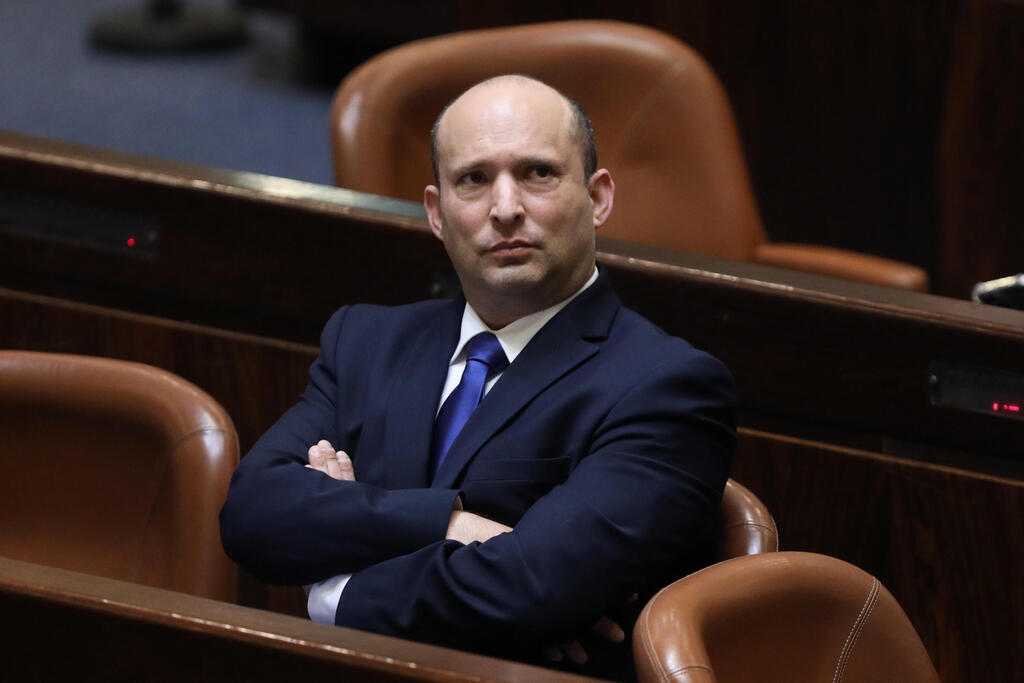

Naftali Bennett watches the Knesset vote that made him prime minister on Sunday night
(Photo: EPA)
Celebrations broke out in Tel Aviv and Jerusalem, which have seen frequent protests against Netanyahu, as Bennett was confirmed as prime minister.
In the plenum, ministers from the former government stood and cleared their seats for the members of new cabinet. Netanyahu briefly shook hands with Bennett and then swiftly departed before the new government was sworn in.
Bennett was sworn in first, his voice clearly wavering as he took the pledge, followed by the rest of his government.
6 View gallery
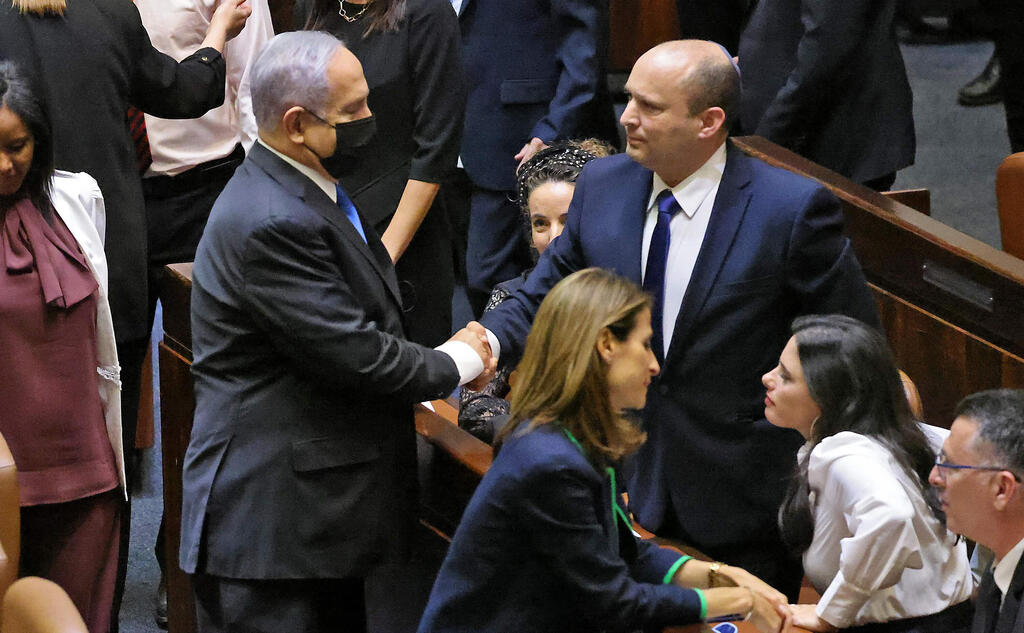

Benjamin Netanyahu shakes hands with Naftali Bennett after he was confirmed as prime minister Sunday night
(Photo: AFP)
Following the vote, the newly inaugurated government held its first cabinet meeting Sunday, with Bennett presiding over the gathering and opening it with the "Shehechiyanu" prayer of thanksgiving.
"The difficulties of forming a unity government are behind us, now the citizens of Israel look upon us," Bennett said. "Now we must prove ourselves, and work together in unity and cooperation to mend the rift among the public and return the state to proper governance after debilitation brought by internal squabbles."
Foreign Minister Yair Lapid, sitting alongside Bennett, said that "what formed this government is friendship and trust, and what is going to maintain this government will be friendship and trust."
The Knesset vote capped a day of speeches in parliament, including Bennett's own that was heavily heckled by members of Netanyahu's outgoing right-wing, religious government, who have accused him of lying to his voters in order to take power.
Bennett, who recently said he was uniting with Arab, left-wing and centrist parties in order to avoid Israel's fifth elections since April 2019, pledged to be a prime minister for all Israelis.
His centrist coalition partner Yair Lapid, who will become prime minister in 2023 as part of their rotation agreement, forwent his own Knesset speech as he expressed outrage at the abuse hurled at Bennett during his address.
6 View gallery
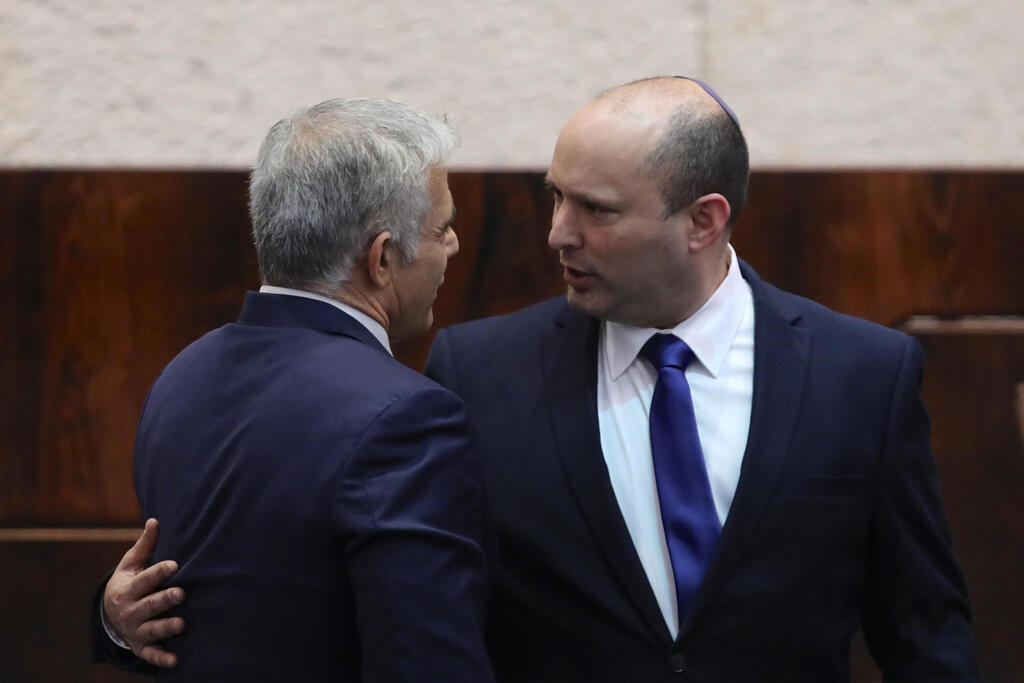

Yair Lapid, left, and Naftali Bennett during the Knesset session preceding the vote of the new government Sunday
(Photo: EPA)
In brief remarks, Lapid said he wanted to "ask for forgiveness from my mother" for having to witness the disruptions during the session at which every MK was invited to take the podium.
Lapid will be foreign minister in the interim, one of 27 ministers in a carefully constructed coalition of right-wing Yamina, New Hope and Yisrael Beytenu, centrist Yesh Atid and Blue & White, left-wing Meretz and Labor and Islamist Ra'am.
The new government marks the end of a political crisis that sparked four elections in two years, including two rounds of voting during the coronavirus pandemic.
6 View gallery
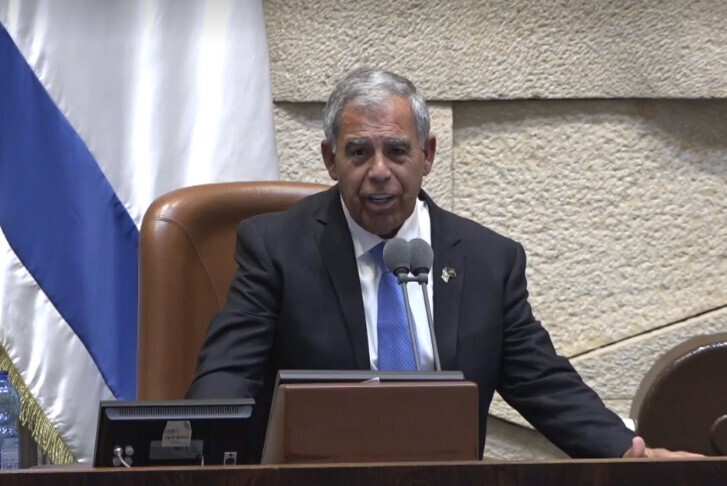

Yesh Atid MK Mickey Levy takes the Knesset speaker's seat after his election to the post Sunday
(Photo: Knesset Channel)
The vote on the government was overseen by new Knesset Speaker Mickey Levy of Yesh Atid, whose election to the post moments beforehand was the first true sign of the changing of the guard.
Levy, a former Jerusalem police chief, declined to make a speech as he took the speaker's seat in order to expedite the process.
Both Bennett and Lapid have said they want to bridge political divides and unite Israelis under a government that will work hard for all its citizens.
6 View gallery


Naftali Bennett's wife Galit, left, and Yair Lapid's wife Lihi watch from the Knesset gallery during the session preceding the vote of the new government Sunday
(Photo: Alex Kolmoisky)
Their cabinet faces considerable diplomatic, security and financial challenges: Iran, a fragile ceasefire with Palestinian terror groups in Gaza, a looming war crimes probe by the International Criminal Court, and economic recovery following the coronavirus pandemic.
On top of that, their patchwork coalition will still have to contend with Netanyahu — who is sure to be a combative head of the opposition.
The leadership in the U.S., Israel's strongest ally, congratulated the new government, with Senate Majority Leader Chuck Schumer expressing the hope "that we can now begin serious negotiations for a two-state solution."
He called on the administration of U.S. President Joe Biden "to do all it can to bring the parties together and help achieve a two-state solution where each side can live side by side in peace."
Biden, who spent Sunday in the U.K. meeting with Queen Elizabeth II, sent his own message of congratulations to the new prime minister, saying in an official statement that he "looks forward to working with Prime Minister Bennett to strengthen all aspects of the close and enduring relationship between our two nations."
"Israel has no better friend than the United States," Biden said. "The bond that unites our people is evidence of our shared values and decades of close cooperation and as we continue to strengthen our partnership, the United States remains unwavering in its support for Israel’s security."
6 View gallery
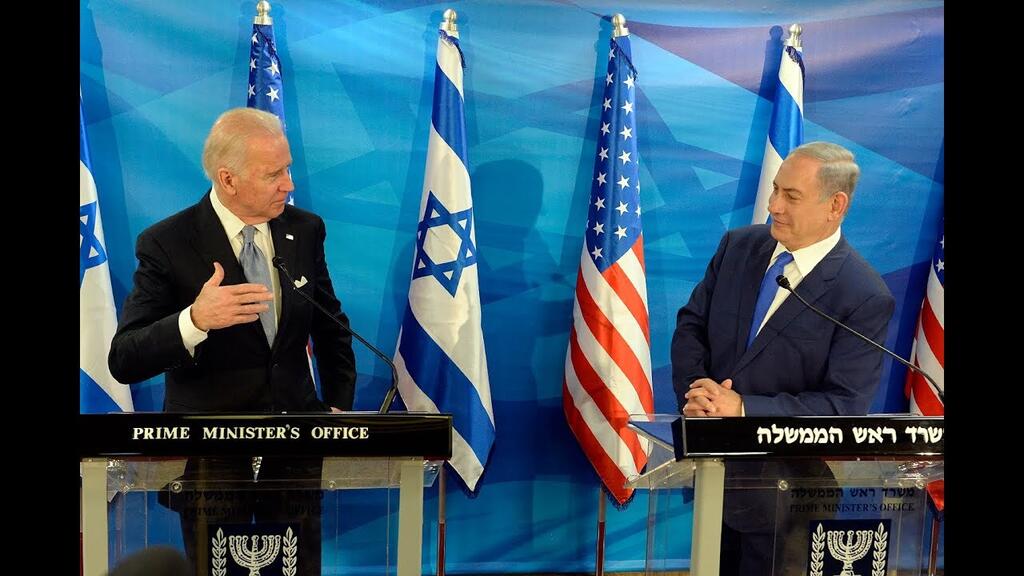

Then-U.S. vice president Joe Biden and former prime minister Benjamin Netanyahu addressing the press in Jerusalem, March 2016
(Photo: U.S. Embassy in Israel)
Biden added his administration was "fully committed to working with the new Israeli government to advance security, stability, and peace for Israelis, Palestinians, and people throughout the broader region."
In Gaza, the ruling Hamas terror organization said it would confront the new government.
Spokesman Fawzi Barhoum said Sunday any Israeli government is "a settler occupier entity that must be resisted by all forms of resistance, foremost of which is the armed resistance."
Hamas and Israel fought an 11-day war last month. The bitter enemies have fought a total of four wars since Hamas, which seeks Israel's destruction, seized control of Gaza in 2007 from the rival Palestinian Authority.
Despite their enmity, the sides have been conducting indirect talks aimed at shoring up a cease-fire. Barhoum said "the behavior of this government on the ground will determine the way and nature of dealing with it on the ground."
First published: 21:01, 06.13.21

